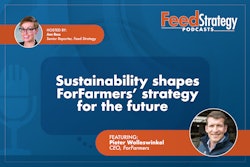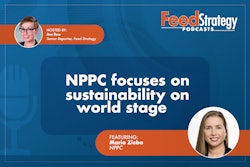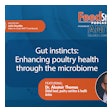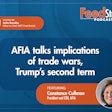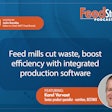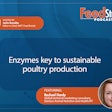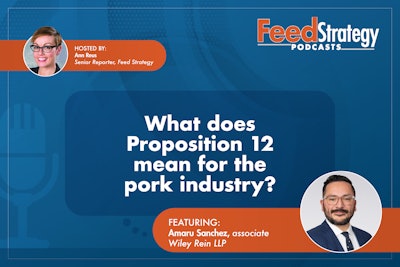
Ann Reus: Hello and welcome to the Feed Strategy podcast. I’m your host, Feed Strategy senior reporter Ann Reus.
Amaru Sanchez is an associate at law firm Wiley Rein LLP, where he counsels domestic and global companies in matters involving products regulated by the U.S. Food and Drug Administration, the U.S. Department of Agriculture and relevant state agencies.
I recently spoke to Sanchez about California’s Proposition 12, which went into full effect in January. Prop 12 establishes minimum space requirements based on square feet for breeding pigs, veal calves and egg-laying hens, and bans the sale of meat and eggs from those animals when they are raised in a way that does not comply with the minimum requirements. Prop 12 withstood legal challenges, when the Supreme Court ruled in May 2023 to uphold the law.
Sanchez and I talked about how Prop 12 affects the U.S. pork industry and how producers can deal with changes brought about by the law. Here’s our conversation.
Hi Amaru. Thanks for joining me.
Amaru Sanchez: Thanks for having me on your podcast.
Reus: Can you explain how Proposition 12 affects regulations within the pork industry?
Sanchez: Sure. Well, Proposition 12, also known as Prop 12, which was endorsed back in 2018 in California, really reshapes the landscape for animal housing standards, especially for breeding pigs. You know, what it does is introduces this mandate that each breeding pig must be allotted a minimum of 24 square feet of usable floor space. I mean, this is quite a leap from the usual 16 to 18 square feet that’s been the norm. Now, the interesting part is that this regulation extends to all uncooked pork sold within California. So, it’s not just impacting producers within the state, but also those outside the state who want to enter the California market. It really is a significant shift that’s influencing both local and national pork producers that sell pork in California.
Reus: What are the specific challenges or concerns pork producers may face as a result of Prop 12 and how can they address them?
Sanchez: Great question. The biggest hurdle that we’ve heard with Prop 12 is the economic impact, you know, particularly the costs of modifying existing facilities, or constructing new ones to comply with these new space requirements. A university study I came across estimates the total expense for this conversion to be in the range of $1.9 billion to $3.2 billion. Now, to put that into perspective, for individual producers, it’s about an investment of $3,500 per breeding pig. Now, for larger operations, you can imagine this scales up to millions of dollars. Now, to navigate these financial challenges, producers are looking at various strategies. You know, these include seeking financial aid, leveraging new technologies to optimize costs, and even rethinking their business models, such as avoiding doing business in California altogether. So, it’s a complex scenario that really demands both innovation and adaptability from the pork industry.
Reus: What operational changes do pork producers now need to implement?
Sanchez: Good question. So, when we talk about the actual changes that pork producers need to implement to comply with Prop 12, it is quite a substantial shift. Essentially, and this was recognized at a recent webinar and in documents provided by the California Department of Food and Agriculture or CDFA, pork producers are likely going to transform their existing breeding pig farms into group pens to meet the confinement standards, you know, this 24 square feet of usable workspace and the turning around freely requirement. Now this isn’t a simple tweak; it is a significant overhaul of their current housing systems. And one of the implications of this change, especially with the new requirement, is that it can lead to a reduction in the number of breeding pigs that a producer can feasibly maintain. It is a major adjustment, how they operate with a clear focus on animal welfare, but also with notable operational implications.
Reus: What legal obligations does Proposition 12 impose on pork producers in terms of animal welfare and how might these obligations differ from previous regulations?
Sanchez: Prop 12 really marks a significant legal shift for pork producers wanting to sell their products in California. It mandates that they provide a substantial amount of space for each breeding pig than what was previously standard. This change really underscores a greater emphasis on animal welfare, steering away from the traditional individual pen approach to a group housing approach, essentially. You know, what we’re witnessing here is a broader movement within agriculture, a move toward prioritizing the well-being of animals, a clear reflection of the evolving perspectives and practices in the industry where animal welfare is becoming a very central concern.
Reus: Are there potential effects on pricing, competition or other market dynamics?
Sanchez: Fantastic question. Now, I do want to preface this by saying that I am not an economist. I’m a lawyer. So, my insights here are purely speculative. But with Prop 12, I mean, there is clearly an anticipated economic ripple effect, especially in terms of consumer prices. You know, considering the increased costs producers are facing to meet these new compliance standards, it’s hypothesized that these costs might be passed down to consumers. Therefore, we might see an uptick in pork prices. We don’t know. While, again, I’m not an expert in economic forecasting, such a price increase could really significantly alter market dynamics. Furthermore, this situation really creates a unique competitive landscape. For instance, producers adhering to these rigorous California standards could potentially be at a competitive disadvantage compared to their counterparts in states with more lenient regulations. Again, this is just my speculation based on the current situation. But overall, we’re looking at a complex scenario where regulatory compliance and market forces intersect. And while I don’t claim to be an economist, these potential outcomes are quite intriguing to consider.
Reus: Are there potential legal challenges or litigation risks associated with Proposition 12?
Sanchez: Here’s where things get really interesting. So, when we consider the legal landscape surrounding Prop 12, it’s interesting to note that there’s theoretical room for further challenges, particularly on the grounds of the Dormant Commerce Clause. Justice (Brett) Kavanaugh and the Supreme Court legal opinion upholding the constitutionality of Prop 12 have concerns about the constitutionality of statutes like Prop 12, not just under the Commerce Clause, but under other legal theories, such as the Import-Export Clause, the Privileges and Immunities Clause and the Full Faith and Credit Clause. This broadens the potential for legal challenges.
Now, in this regard, there’s a relevant development here: A Missouri-based pork producer, which operates in various markets, including Massachusetts, was clearly paying attention to what Justice Kavanaugh’s writing. Right now, I’m sure you and your listeners know that Massachusetts is currently rolling out its own animal welfare law, the Act To Prevent Cruelty To Farm Animals, also known as Question 3, which is similar to Prop 12. In a recent lawsuit filed by this Missouri-based producer, they closely mirrored Kavanagh’s arguments. It’s intriguing to see how closely their legal strategy aligns with the points raised by the justice. Now, moreover, in a separate or related case in Massachusetts, the Massachusetts Restaurant Association v. Healy, there’s been a delay in the implementation of Question 3 with U.S. District Judge Margaret Guzman approving a stay postponing the enactment of this law for at least six months. All these developments suggest that constitutionality of Prop 12 and similar laws may well be up for debate again. As for the future, it remains to be seen how these legal battles will unfold and what implications they might have for Prop 12 and similar statutes.
Reus: That’s an interesting point. How will Prop 12 be enforced, and what are the penalties for non-compliance?
Sanchez: So, the enforcement of Prop 12 falls squarely under the purview of the California Department of Food and Agriculture, or CDFA. If your producer knowingly sells products that don’t comply with Prop 12’s animal confinement rules, they’re committing a misdemeanor. This can lead up to a fine of $1,000 or imprisonment in the county jail for up to 180 days or potentially both. However, there’s an exemption here to be aware of. Prop 12 doesn’t apply to combination food products like soups, sandwiches, pizza, hot dogs, or other similar processed or prepared foods. So, the decision to enforce specific legal remedies under the law is at the discretion of the state attorney general or local authorities, such as the district or city attorneys. In what can be seen as an effort to help stakeholders affected by Prop 12, the CDFA created a webpage with resources and materials that guide stakeholders through Prop 12. And here you can find printed material as well as videos I found very helpful. You know, it’s a comprehensive approach, ensuring that the law’s reach extends beyond just impacting the entire supply chain.
Reus: Interesting points there, too. Well, thank you so much for talking with me.
Sanchez: It’s my pleasure. Thank you again for having me and great topic.
Reus: And thank you to the audience for listening. I’m Ann Reus for Feed Strategy.

